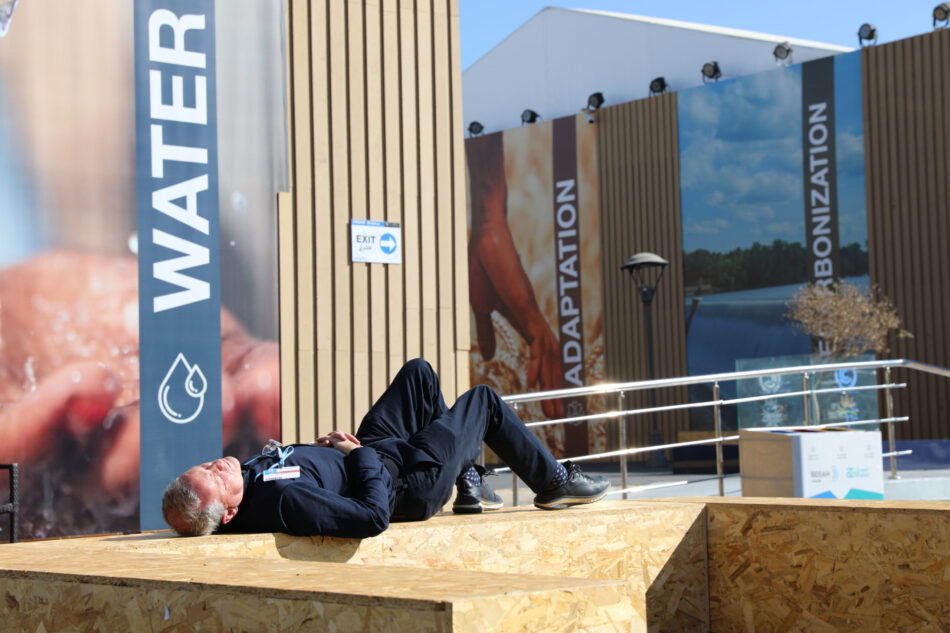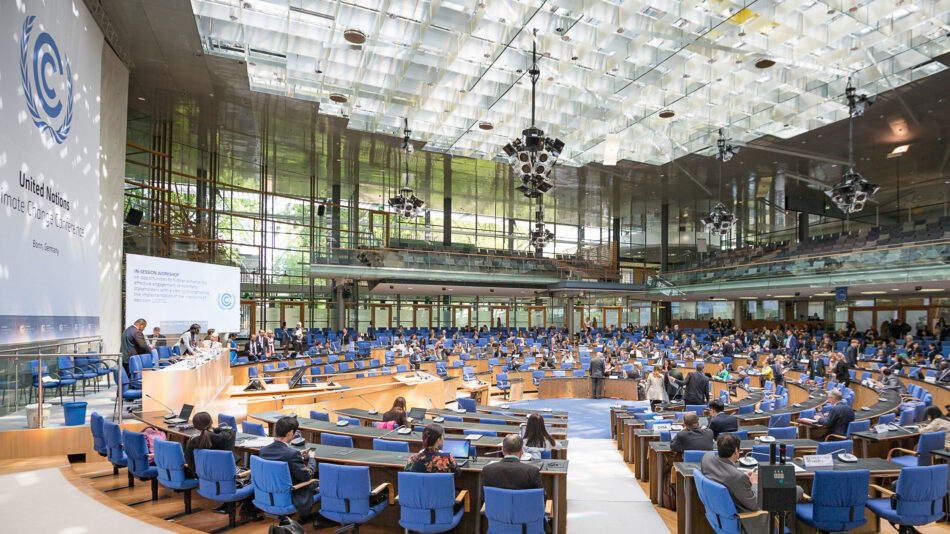To be effective, COP requires months of groundwork, continued support to negotiators, measuring progress and action for sustainable development.
By Luisa Chantler Edmond, Princeton in Asia Fellow

For the past few days, you may have noticed climate news dominating your screens more than usual. The reason is that the annual climate conference is about to start. This year, the annual United Nations Framework Convention on Climate Change (UNFCCC) Conference of Parties (COP), as it is formally known, will take place in Dubai. As the COP28 Presidency, the United Arab Emirates will host journalists, activists, influencers, NGOs, research organizations and government delegations involved in climate negotiations. All of COP’s attendees are in pursuit of the UNFCCC’s Paris Agreement “to keep the global average temperature rise this century as close as possible to 1.5 degrees Celsius above pre-industrial levels”
In an attention-scarce world, this storm of press will capitalize on the spotlight the climate conference casts on the climate crisis; hoping to both inspire and engage the public. COP28 represents a yearly opportunity for country delegations from across the globe to convene on “the best ways to address climate change, while taking each other’s circumstances into account”.
However, it is important to note that the climate conference does not just last for two weeks. For COPs to be effective they require months of preparation, consistent measuring of the progress towards nationally determined contributions (NDCs), and resolute commitment to acting for sustainable development.
COP28 started the day COP27 finished
To ensure that the parties of the UNFCCC are making significant progress, country delegations prepare recommendations and solutions throughout the year.
COP27’s cover decision, Sharm el-Sheikh Implementation Plan recognized the “critical role of protecting, conserving and restoring water systems to deliver adaptation benefits, while ensuring social and environmental safeguards.” This statement was demonstrative of the success of water sector actors at COP27 and underlined why it is important that we challenge water problems and scale up solutions; water is the heart of sustainable development. At IWMI we are proud to be an active member of the water community that influenced water’s inclusion in the COP27 cover decision.
Capitalizing on the international agreement, our delegates began looking forward to COP28 the moment COP27’s pavilions came down. Over the past year, we have been working alongside key decision-makers to provide them with the research and evidence that will enable them to influence development policy. IWMI’s post-COP27 contributions to UNFCCC processes, including both the Africa and MENA region climate weeks, were notable in helping decision-makers make the right choices regarding water, land, and food systems and accelerate capacity building.
IWMI has been an active participant COP, but in recent times our participation has expanded significantly; we now have scientists joining party delegations to take on a focal role for water in the negotiation rooms. As a member of the water steering committee that oversees the Water for Climate Pavilion and an active participant in CGIAR’s Food and Agriculture Pavilion we have been able to ensure water features as a central part of discussions. As a UNFCCC observer organization, IWMI has access to the blue zone of the conference. This is the highly restricted area of the conference where all official sessions, meetings, and press conferences take place. IWMI supports governments in their efforts to meet the terms of the Paris Agreement and during COP27 in Egypt we emphasized the role of water in a changing climate. There, our science-based knowledge informed and advised decision-makers and negotiators.
Water security is at the negotiating table
At IWMI our work with negotiators is driven by the question; “how can we best support country delegations in the negotiation rooms on water/food and land systems and at their events?
IWMI is a partner organization of the African Group of Negotiators Expert Support (AGNES). AGNES’s pre-COP28 work has been comprised of strategic collaboration with stakeholders, national dialogues with public and private sector actors, policy advocacy at leadership events, and contributions to the continent’s Nationally Determined Contributions (NDCs). As part of our collaboration with AGNES and its partners, IWMI co-hosted the pre-COP AGNES strategy meeting in Nairobi, Kenya. The event helped to inform a collaborative framework focused on bolstering Africa’s representation and active participation in climate change negotiations.
Advancing commitments to adaptation finance is an important issue for AGNES who primarily represent developing nations, many of whom are struggling to deal with the socio-economic impacts of loss and damage. Building resilience to the climate crisis requires an informed understanding of the science and data that influence current vulnerabilities. Ahead of COP28 AGNES made a submission to the Standing Committee on Finance (SCF) regarding the doubling of adaptation finance to developing nations in which IWMI’s support was named and highlighted. The submission urged developed country parties to “at least double their collective provision of climate finance for adaptation to developing country parties…” and offered possible recommendations to overcome challenges in doubling adaptation finance.
Andrew Okem, IWMI Regional researcher on climate adaptation and governance, together with IWMI Ghana staff produced key policy briefs indicating how water security policy can be incorporated into their sustainable development plans. “Our collaborative engagement with AGNES has proven to be an influential alliance; facilitating the dissemination of knowledge within the African policy sphere while effectively amplifying the ramifications of IWMI’s research for development,” Okem said.
Due to its Egyptian presidency, COP27 was referred to by many as the ‘Africa COP.’ African delegations in Sharm El Sheikh were excited for an opportunity to take center stage and lobby for their interests at what is the world’s most important negotiating table for climate and sustainable development issues. Now that the presidency has passed to the UAE, it is even more important that delegations like AGNES are supported in their conference preparation.

Are we on track?
“Re-evaluating and adjusting NDCs, adaptation plans, and long-term strategies within the scope of the Global Stocktake will demonstrate the untapped opportunities for water-based climate adaptation and mitigation.” – Vidhisha Samarasekara, IWMI Strategic Program Director on Water Climate Change and Resilience. The Global Stocktake (GST) looks at where the world stands on climate action and works to chart a better course towards meeting our goals. The GST will take place every five years at COP with the inaugural GST concluding at COP28 with the consideration of outputs which will include “recommendations for strengthening action and enhancing support.”
Last year, IWMI was invited to provide our expertise to the Global Stocktake (GST) – following a formal technical submission to the GST. IWMI facilitated the World Café under the technical dialogue in Sharm El Sheikh, where we called attention to the fact that “collective action would be more effective if water systems were more comprehensively integrated into the Paris NDC approach.”
Traditionally, the international agreement debuted at the end of COP acts as our collective progress report, assessing where government commitments and NDCs are working and where they are not. At COP28 our collective progress report will be much more robust thanks to the GST. IWMI has supported the GST procedure from start to finish and the invitation to share our experience with the GST co-facilitators is demonstrative of the importance of water to the stocktaking procedure.
Acting for sustainable development
A whole year of preparations ensures the next climate conference runs successfully and the review process will accelerate climate commitments, but what about the action itself?
On December 10, the penultimate day of COP28, final negotiations and agreements will be made during the thematic day dedicated to Food, Agriculture, and Water. In anticipation of this final thematic day IWMI was invited to assist the presidency with planning the day’s events alongside partners including; the Food and Agriculture Organization of the United Nations (FAO), the NDC Partnership, the UNFCCC, the World Economic Forum and World Farmers’ Organization (WFO).
The headline event on day 11 of COP will be the inaugural ministerial dialogue on water-resilient food systems and the launch of a promising new two-year partnership under the UNFCCC’s Climate Resilient Systems Alliance. IWMI was invited as part of a select advisory committee to plan both events.
What’s next for the Conference of Parties?
COP28 will run for two weeks, two weeks in which the world will reflect on our climate trajectory and agree on next steps towards ending the climate crisis. Each of the UNFCCC parties and their partners understand the importance of challenging the business-as-usual approach to climate change. So, as the cameras are packed up and the journalists head home, remember that the next COP is already being planned. The international agreement informed by the GST and forged at COP28 will act as the touchstone for all organizations working tirelessly to end the climate crisis and advance sustainable development.
As a research-for-development organization, IWMI undertakes research that promotes the need to integrate water management strategies into broader climate adaptation and mitigation efforts. For over thirty years our research results and projects have led to changes in water and land management that have contributed to social and economic development. We were proud to continue this tradition at COP27 and will support government delegations at COP28 and future negotiations until we meet our sustainable development goals.


